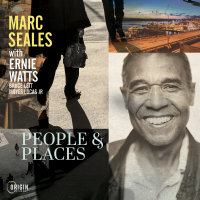Home » Jazz Articles » Big Band Report » Los Angeles Jazz Institute Festival - Woodchopper's Ball: Part 3-4
Los Angeles Jazz Institute Festival - Woodchopper's Ball: Part 3-4
Four Points by Sheraton at LAX
Los Angeles, CA
May 23-27, 2018
Part 1 | Part 2 | Part 3 | Part 4
Concert 8: The Herdsmen -Bobby Shew meets Larry McKenna
Trumpeter
Bobby Shew
trumpetb.1941

Woody Herman
band / ensemble / orchestra1913 - 1987

Larry McKenna
saxophone, tenor1937 - 2023
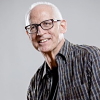
Rich Eames
piano
Paul Kreibich
drumsAn unnamed first tune with an easy-going melody opened the concert. McKenna led off with characteristically confident but laid-back, fluent tenor lines, and Shew responded in equal measure, with cheerful, flowing bebop lines. Eames played an upbeat piano solo, and Conner produced elegant, clear bass lines, gradually building in intensity, and the two horns traded in conversation with Kreibich's drums for several choruses. Next was

Sergio Mendes
piano1941 - 2024

Hoagy Carmichael
piano1899 - 1981
"How About You" by Burton Lane was back at an easy-going tempo, and again showcased McKenna's brilliant solo architecture, well-paced, with flowing melodic lines. Shew followed with beautiful, clean lines, relaxed but exciting. Eames' right hand piano lines danced. Drummer Paul Kreibich took a solo chorus, rhythmically imaginative and probing. They slowed to a ballad tempo for McKenna to take the melody on Rodgers and Hart's "It Might As Well Be Spring," with subtle rhythm section interplay, particularly Rich Eames' sensitive piano accompaniment. McKenna again constructed his exquisite melodic phrases, finding all the right notes in a superb ballad interpretation of this attractive song. Eames played an agreeable piano half-chorus, before Shew reappeared gently playing on the bridge, before the tenor man closed the tune, with Shew's elegant harmonies beneath. The finale was a McKenna original, "You Know It's Me," a hard-bop swinger with unison horn melody. Larry then unleashed a harder-hitting, bigger tenor sound for two choruses, Shew played two feisty, confident, bluesy choruses; Eames seemed to take more risks rhythmically, and reach a higher plane with his playful lines, and Conner gave another bold but easy-going bass solo. Kreibich again took a whole drum solo chorus, before this memorable McKenna tune came back for the final time.
In no way does it detract from Bobby Shew's brilliance or accomplishments to say that McKenna's playing was a revelation, not just to those previously unfamiliar with his playing but for all in the audience. He is a major tenor saxophonist capable of remarkably consistent and inspired melodic invention, and definitely a talent deserving of far wider recognition. It was no surprise that, at the CD stand afterward, McKenna's CDs sold like hot cakes. This man plays wonderful jazz, and at 81, seems to have a great deal of music still to play. One can only hope that many more will discover him.
Panel 2: Woody's Winners -Moderated by Larry Hathaway
Larry Hathaway facilitated a fascinating and insightful panel discussion with five Herman alumni. Trumpeter Bobby Shew described joining Woody in 1965, with the good fortune to be on the much-acclaimed recordings My Kind Of Broadway and Woody's Winners, and staying on band for ten months.Tenor man Larry McKenna joined the band in 1959, and mentioned the high-calibre trumpet section lineup at that time, including Bill Chase, Paul Fontaine and
Don Rader
trumpetb.1935

Don Lanphere
saxophone1928 - 2003

Gary Anderson
woodwindsb.1947

Andy LaVerne
pianob.1947

Gregory Herbert
saxophone1947 - 1978

Frank Tiberi
saxophone, tenorb.1928

Alan Broadbent
pianob.1947
Bill Stapleton
b.1945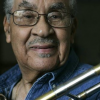
Jimmy Wilkins
trombone1921 - 2018

Ernie Wilkins
arranger1922 - 1999
Pianist Alan Broadbent, originally from New Zealand, came to the USA on a Berklee scholarship, studied with

Lennie Tristano
piano1919 - 1978
Various stories and anecdotes of their times with Woody were described, including the many dance gigs that the band continued to play into the 1970s and beyond, an economic necessity to keep on the road, but not uniformly musically happy occasions. This included discussion of Woody's strategies for dealing with hecklers and the ignorant—his terse words, usually ending in "Pal," which, for Woody, was not a term of endearment. As the years went by, Woody fraternized less frequently with the band, but he remained a major nurturer of young jazz talent, but his exacting standard remained high. It was mentioned that Woody and his wife lived in the house that Humphrey Bogart originally built for Lauren Bacall.
Concert 9: Alan Broadbent (solo piano)
New Zealand born Alan Broadbent has had a distinguished and highly productive career in jazz, as a pianist, spending three years on the road with Woody Herman in his twenties, and, in the decades since, particularly in the piano trio setting, with many, critically-acclaimed trio recordings and Grammy nominations -and as a member of the highly regarded Quartet West with the late
Charlie Haden
bass, acoustic1937 - 2014

Natalie Cole
vocals1950 - 2015

Diana Krall
piano and vocalsb.1964
Broadbent is a very resourceful pianist with a comprehensive technique: he plays ballads with great sensitivity and swings hard at faster tempos, and is known for his left-right hand independence. On this occasion, Broadbent had been invited to perform as a solo pianist, an intimate and introspective setting, in which he chose to express more of his romantic and reflective side and have a chance to stretch out, without the usual boundaries of trio format.
"Hello, My Lovely," by Charlie Haden began with a pensive, rhapsodic introduction, including a rubato statement of the melody, and then an in-tempo solo exploration of this "Parker Blues"-like structure with nice bluesy inflections. Jerome Kern's "All The Things You Are" began with a meandering chorus, in which he teased with fragments of the melody. He went into tempo for a boppy rendition, soloing against left hand bass lines, using the standard Gillespie vamping at beginning and end. "Body And Soul" began with a probing intro, with many right hand flurries of notes and chunky bass register chords. Broadbent continued with a left hand improvised solo with right hand accompaniment followed by a role reversal, and the right hand taking the solo, never straying too far from the melody, throwing out 'anchors' every so often. He returned to the melody with more right hand flurries and ended quietly, ending a thoughtful exploration of Green's beloved tune.
"Lullaby Of The Leaves," by Bernice Petkere, began in tempo, with the melody stated in contrapuntal interplay between left and right hands, with an off-beat swing bridge, and right hand bebop soloing over walking left hand bass lines. "With The Wind And The Rain In Her Hair" started with a moody, chordal introduction with strong left hand runs, although this did seem to bury the melody somewhat. He went into tempo for a restatement of the melody over a jagged bass accompaniment, and his solo continued to reference the melody, with some dazzling double-timing in both hands.
Broadbent went on to play a medley of two

Dizzy Gillespie
trumpet1917 - 1993
The 1930s

Count Basie
piano1904 - 1984

Duke Ellington
piano1899 - 1974

John Lewis
piano1920 - 2001
Did it swing? Was it all jazz? Was there any connection to Woody Herman? Does it matter in the end? There was much debate afterward. There is no doubt that Broadbent paints with a broad brush, and that he has extraordinary command of the piano, and has a solid reputation as a swinging trio pianist. However, alone at the piano on this occasion, he used the freedom to express other facets of his musical personality.
Concert 10: The Swinging Sixties -Directed by Michael Berkowitz
Ken Poston introduced this concert, with mention of some of the key musical personalities in the 1960s Woody Herman Herds, including trumpeter
Bill Chase
trumpet1934 - 1974

Sal Nistico
saxophone1948 - 1991
Phil Wilson
b.1937
Nat Pierce
piano1925 - 1992
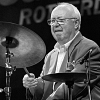
Jake Hanna
drums1931 - 2010
Michael Berkowitz
bass, electricThe concert opened with "Mo-Lasses," composed by Count Basie trumpeter

Joe Newman
trumpet1922 - 1992

Roger Neumann
saxophone, tenorb.1941
Jeff Bunnell
trumpet
John Fedchock
tromboneb.1957
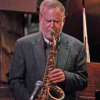
Kim Richmond
saxophoneA change of mood, and

Henry Mancini
composer / conductor1924 - 1994

Kim Richmond
saxophone
Mark Lewis
saxophoneb.1958
"Hallelujah Time," a happy, fast, swinging, gospel-like tune, was taken by the reed section, and showcased Gary Anderson and Larry McKenna in an exciting tenor chase with punchy ensemble interjections. The pace slowed right down for "It's a Lonesome Old Town" (by Kisco, Tobias and Van Alstyne), a slow swinging ballad, originally a feature for trombonist Phil Wilson. On this occasion, the spotlight was on John Fedchock, sharing the melody with Richmond's clarinet. Fedchock played a smooth, impeccably pure-toned but emotionally moving trombone solo with a nice cadenza. "That's Where It Is" (by Teddy Castion, arranged Nat Pierce) was a fast-and-swinging gospel-influenced tune, which featured upper register pyrotechnics from trumpeter
Ron King
trumpetWoody Herman had an abiding love and respect for the music of Duke Ellington, and in this concert,

Tommy Newsom
saxophone1929 - 2007
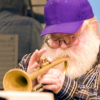
Ron Stout
trumpetSonny Boy (by Lew Brown and Ray Henderson, arranged

Ralph Burns
piano1922 - 2001

Scott Whitfield
tromboneb.1963
Slowing the pace and quieting the mood was the lovely Nat Pierce arrangement of Newley and Bricusse's "Who Can I Turn To," originally recorded on My Kind Of Broadway, which began with Rich Eames' neat piano intro. Kim Richmond's alto sax carried the melody over sensuous reed-and-bone section backgrounds, and then a haunting alto solo. Larry McKenna followed with a superb, lyrical tenor solo, the notes and phrases always landing beautifully in the right places, before the band returned to the melody, handing it back to Richmond's alto for the final melody and a bright cadenza.
The swinging "Sig Ep," by trumpeter Jack Gale, from Woody Herman 1963, its structure based on "Ja-Da," was heard initially with unison reeds, joined by brass interjections, climaxing in a full ensemble. Solos were from Gary Anderson's big- toned, muscular tenor sax, and from Bobby Shew's terrific, bluesy trumpet. Ensemble passages aptly quoted from

Sonny Rollins
saxophoneb.1930
The 1960's Woody Herman band moved forward in a number of directions. One significant influence on the band was John Coltrane, particularly on the evolving solo styles of the reed players in the band in the decades that followed, and on the incorporation of some of his compositions like "Giant Steps" and "Naima" into the band book. "Dear John C," composed and arranged by " data-original-title="" title="">Bob Hammer, reflected Coltrane's modal compositional influence. Somewhat patterned on "Impressions" (Coltrane's adaptation of Morton Gould's "Pavanne" to the structure of

Miles Davis
trumpet1926 - 1991
Nat Pierce's arrangement of "The Good Life," by Jack Reardon and Sasha Distel, began with a bold start in a two-beat, medium-swing feel, with Richmond's passionate alto sax lead. A solo chorus was split between tenor sax man Larry McKenna's wonderful melodic lines and Mark Lewis' sparkling, harmon-muted trumpet bebop lines, and it finished with a powerful ensemble shout chorus. The concert concluded with Raoul Romero's arrangement of Rodgers and Hammerstein's "My Favorite Things," also from My Kind Of Broadway. Taken at a fast tempo in four, this magnificent arrangement has weathered very well, maintaining the original excitement, and featured spirited clarinet solo work from Richmond, and a brilliant, virtuoso trombone solo from Scott Whitfield. The final climactic ensemble melody passages, with its cleverly-altered chord changes, brought this fine concert to an exciting end.
Film Session 4: Fanfare for the Common Man -Rare films from the L.A. Jazz Institute Archive
Ken Poston's final chapter of the Woody Herman story on film began with a Jerry Lewis Show appearance by the Herd from 1957, with performances of "Blue Flame" and "Caldonia," featuring tenor man
Paul Quinichette
saxophone, tenor1916 - 1983
A 1965 appearance in the Ed Sullivan Show, showed the band in magnificent form, playing the fast and swinging "My Favorite Things," featuring

Bill Chase
trumpet1934 - 1974
Ronnie Zito
drumsA 1966 Vienna performance of

Horace Silver
piano1928 - 2014

Julian Priester
tromboneb.1935

Sal Nistico
saxophone1948 - 1991

Cecil Payne
saxophone, baritone1922 - 2007

Tony Bennett
vocals1926 - 2023

Ed Soph
drumsb.1945

Nick Brignola
saxophone, baritone1936 - 2002

John Hicks
piano1941 - 2006

Zoot Sims
saxophone, tenor1925 - 1985

Guido Basso
trumpet1937 - 2023
Ken spoke about the increased recruitment by Woody of accomplished students from the ranks of the North Texas State Jazz lab band other top jazz breeding grounds. From a 1977 tour of Poland, Woody's band played

Chick Corea
piano1941 - 2021

Joe Lovano
drumsb.1952

John Coltrane
saxophone1926 - 1967
In 1979 festival in Nice, France, showed Woody on soprano sax, playing Gary Anderson's arrangement of Aaron Copland's "Fanfare For The Common Man." Also noteworthy were

Gary Smulyan
saxophone, baritoneb.1956

Bob Belden
arrangerb.1956

Mike Brignola
saxophone, baritoneConcert 11: One Night Stand: Charlie Barnet vs. Woody With The Herman Battle of the Bands
One Night Stand With The Battle Of The Bands was a re-creation of the famous Rendezvous Ballroom encounter on July 30, 1949, between the Woody Herman and
Charlie Barnet
saxophone1913 - 1991

Ken Peplowski
woodwindsb.1959
Brian O'Rourke
pianoThe Herman band fired back with "Lolly Pop," by

Shorty Rogers
trumpet1924 - 1994

Terry Gibbs
vibraphoneb.1924

Jacques Voyemant
tromboneThe Barnet band returned with "Eugipelliv," by Paul Villepigue, composer/arranger with the 40s Barnet band, the name being his name spelt backwards. Featuring Latin rhythm and sprightly brass section work, the forward-looking 40's Barnet reed- section sound, with soprano saxophone on top, was prominent,
Fred Laurence Selden
b.1945The Herman band continued with Ellington's "I Got It Bad And That Ain't Good," arranged by

Shorty Rogers
trumpet1924 - 1994
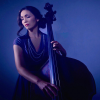
Katie Thiroux
bass
Jim Cox
keyboards
Manny Albam
arranger1922 - 2001
The Herman band hit a winner with Jimmy Giuffre's beloved "Four Brothers." This featured a stellar reed section, and strong solos from
Brian Williams
bass
Doug Webb
saxophone
Roger Neumann
saxophone, tenorb.1941
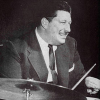
Tiny Kahn
drums
Harold Arlen
composer / conductor1905 - 1986

Ralph Burns
piano1922 - 2001
Annie Patterson
saxophone
Roger Neumann
saxophone, tenorb.1941

Ray Noble
composer / conductor1903 - 1978
Championed by the Charlie Barnet band in the 1940s in a

Billy May
composer / conductor1916 - 2004

Charlie Parker
saxophone, alto1920 - 1955
Alan Kaplan
tromboneRon King
trumpetDave Stone
bass, acoustic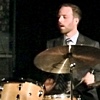
Matt Witek
drums
Kai Winding
trombone1922 - 1983
Blaring brass introduced a boppy trombone melody, a fiery ensemble bridge, with nice bone harmonies. Passionate solos followed from Kaplan's trombone, Moody's tenor and
Rusty Higgins
saxophone, alto
Shorty Rogers
trumpet1924 - 1994

Doug Webb
saxophoneJeff Bunnell
trumpetTags
Big Band Report
Simon Pilbrow
Bobby Shew
Woody Herman
Larry McKenna
Rich Eames
Chris Conner
Paul Kreibich
Sergio Mendes
Hoagy Carmichael
Paul Fontaine
Don Rader
Don Lanphere
Gary Anderson
Andy LaVerne
Greg Herbert
Frank Tiberi
Alan Broadbent
Bill Stapleton
Jimmy Wilkins
Ernie Wilkins
Lennie Tristano
Charlie Haden
Natalie Cole
Diana Krall
Dizzy Gillespie
Count Basie
duke ellington
John Lewis
Bill Chase
Sal Nistico
Phil Wilson
Nat Pierce
Jake Hanna
Michael Berkowitz
Joe Newman
Roger Neumann
Jeff Bunnell
Tom Delaney
John Fedchock
Kim Richmond
Henry Mancini
Kim Richmond
Mark Lewis
Ron King
Tommy Newsom
Keith Bishop
Ron Stout
Ralph Burns
Sonny Rollins
Bob Hammer
Morton Gould
Miles Davis
Raoul Romero
Paul Quinichette
Charles Sandford
Ronnie Zito
Horace Silver
Julian Priester
Cecil Payne
Tony Bennett
Ed Soph
Nick Brignola
John Hicks
Zoot Sims
Guido Basso
Chick Corea
joe lovano
John Coltrane
Aaron Copland
Gary Smulyan
Bob Belden
Mike Brignola
Charlie Barnet
Ken Peplowski
Brian O'Rourke
Shorty Rogers
Terry Gibbs
Jacques Voyemant
Paul Villepigue
Fred Selden
Katie Thiroux
Jim Cox
Manny Albam
Brian Williams
Doug Webb
Tiny Kahn
Harold Arlen
Ann Patterson
Ray Noble
Billy May
Charlie Parker
Dave Moody
Winston Byrd
Alan Kaplan
Dave Stone
Matt Witek
Kai Winding
Rusty Higgins
Comments
PREVIOUS / NEXT
Support All About Jazz
 All About Jazz has been a pillar of jazz since 1995, championing it as an art form and, more importantly, supporting the musicians who make it. Our enduring commitment has made "AAJ" one of the most culturally important websites of its kind, read by hundreds of thousands of fans, musicians and industry figures every month.
All About Jazz has been a pillar of jazz since 1995, championing it as an art form and, more importantly, supporting the musicians who make it. Our enduring commitment has made "AAJ" one of the most culturally important websites of its kind, read by hundreds of thousands of fans, musicians and industry figures every month.
Go Ad Free!
To maintain our platform while developing new means to foster jazz discovery and connectivity, we need your help. You can become a sustaining member for as little as $20 and in return, we'll immediately hide those pesky ads plus provide access to future articles for a full year. This winning combination vastly improves your AAJ experience and allow us to vigorously build on the pioneering work we first started in 1995. So enjoy an ad-free AAJ experience and help us remain a positive beacon for jazz by making a donation today.

Los Angeles
Concert Guide | Venue Guide | Local Businesses
| More...



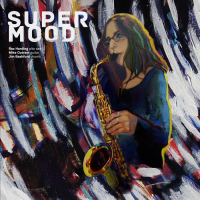


 Buy Now
Buy Now





